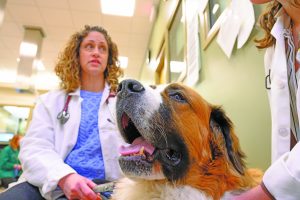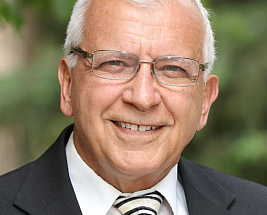Preparing to say goodbye: a 3 part series on pet loss
It’s hard to lose a friend.
When that friend is a beloved pet you’ve shared your life and your heart with, it can feel like part of you is being torn away from you.
“I didn’t know anything,” said Jessica Pierce, Ph.D., when she learned her dog, Ody, was dying. A bioethicist and author of several books on pets including “The Last Walk,” about Ody’s end of life journey with her.
“His was a really hard deterioration. He lost control of his back legs and his bowels. He was clearly distressed. He lost most of his vision and couldn’t hear well.

Photo courtesy of CSU – Dr. Kate Vickery, Assistant Professor of Clinical Sciences, Medical Oncology, James L. Voss Veterinary Teaching Hospital, Colorado State University.
“How will I know when Ody’s had enough?” she wondered, wanting only to do what was best for him. “Is it ethical to hasten his death, to make a decision his life was no longer worth living?”
It’s common for pet owners to feel anxious when faced with the unknown, said Maria Gore, Director of Operations and Program Services at the Argus Institute at Colorado State University’s James L. Voss Veterinary Teaching Hospital in Fort Collins. “A lot of emotions will come up.”
Pet owners may experience anxiety, which can manifest in physical symptoms like tightness in the chest or shortness of breath, crying, sleep disturbances, depression and irritability and more.
They may feel angry at the situation or at having to make the decision, she said. Many like to think their pets will die in their sleep, and then something they didn’t expect happens.
Some people seek refuge in denial. Others may start to experience grief and blame themselves for their pet’s illness.
Spiritual people can feel their beliefs being shaken up and may ask God for help.
“Feelings need to be respected and honored. They’re valid, not abnormal,” said Gore. “You have to acknowledge them but at the same time allow yourself to adapt to the news you’ve been given about your pet.
“A decision needs to be made soon.”
“You have to really be an advocate for your animal,” said Pierce.
But it’s hard to make decisions for a dying animal when you are overwhelmed with grief.
“People feel so out of control when this happens,”
said Erin Allen, Clinical Support Service Associate Director of the Argus Institute. “Anticipatory grief begins at the time of diagnosis.”
As pet owners start to think about the options, she helps them re-frame the problem.
It’s important to do that because it’s common for pet owners to have regrets after their pet dies. Some are powerful enough to cause enduring mental health problems, including complicated grief and post-traumatic stress disorder.
Re-framing includes having control where you can, said Allen.
The disease will eventually win. What is the disease, she asks people. “The disease is causing the animal’s life to end.
“People spend so much effort to protect their pet’s quality of life. To minimize regrets,” she tells them, “you get to control the quality of death: who’s there, what happens. Control it. Make it beautiful.”
When euthanasia is the choice, “it’s protecting the quality of dying. You’re taking control over the death, not the disease.”
It is also important for pet owners to get the help and support they need to make the decisions for their animals.
“A lot of pain comes from not having enough support at the right time,” said Amir Shanan, a certified hospice and palliative care veterinarian. The lead author of the book “Hospice and Palliative Care for Companion Animals,” and one of the founders of the Animal Hospice Group, a California-based organization that provides educational opportunities and a national helpline providing support and guidance for callers that will begin operation in May 2022.
“The key is what happens before the pet dies,” he said. Research studies have shown that 40 to 80% of pet owners suffer painful mental health problems when “pet loss didn’t go so well. They’re affected in the heart, carrying this pain for many years. There’s going to be a price somewhere.
“The best kind of decision making at the end of life is collaborative. In principle, this means the medical team and the family are actively participating in formulating the decision. The doctor has one kind of experience, the client has a different kind. They collaborate to make the best decision under the circumstances of uncertainty.
“They need to integrate perspectives and hopefully come up with a consensus solution that’s most likely to satisfy clinical requirements, personal and ethical requirements.
“There are many variables looking for the best, imperfect solution so that the decision-maker will have the least amount of regret.”
Next in part two: “A sacred and precious time.”
- August, 05 2021

Police involved shooting in Berthoud
Around 10 p.m. Wednesday night Larimer County Sheriff’s Office received a report of a suspected...
- January, 12 2018

Berthoud artist Michael Magee feature...
Courtesy photo - Berthoud artist Michael Magee painting one of his...
- March, 25 2022

Three Berthoud Robotics teams head to...
Three Berthoud Robotics teams are headed to the VEX Robotics Worlds Championship this year to...
- January, 18 2019

Berthoud Habitat for Humanity casino ...
By Autumn Leopold The Surveyor Berthoud Habitat for Humanity (BHFH) is keeping it “Colorado” for...
- July, 13 2017

Give one new business a try each week
There are a couple of thoughts I would like to share with the residents of...
- August, 12 2015

Berthoud area entrant results in the ...
Department A - Beef Category 1-Heifers 1123#-1170# 2nd - Catherine Schlagel Category 1-Heifers 1213#-1348# 3rd...

POLICEBLOTTER
Community News
Northern Water sets C-BT quota at 70% for 2024
Community News

Emotions run high during Revere Property hearing
Community News
Snowpack at 119% above normal
Community News

Karspeck to serve third term as Berthoud mayor
Community News

OPINION – No bitchin’ allowed
Community News
Roy Tripi to become principal of BHS on July 1
Community News
COMMUNITY CALENDAR:
Community Calendar – add an event
Homestead Fine Art Gallery First Fridays OPEN HOUSE
03 May 4:00 PM - 7:00 PM
Homestead Fine Art Gallery First Fridays OPEN HOUSE
07 Jun 4:00 PM - 7:00 PM
Homestead Fine Art Gallery First Fridays OPEN HOUSE
05 Jul 4:00 PM - 7:00 PM
Homestead Fine Art Gallery First Fridays OPEN HOUSE
02 Aug 4:00 PM - 7:00 PM
Homestead Fine Art Gallery First Fridays OPEN HOUSE
06 Sep 4:00 PM - 7:00 PM
Homestead Fine Art Gallery First Fridays OPEN HOUSE
04 Oct 4:00 PM - 7:00 PM

